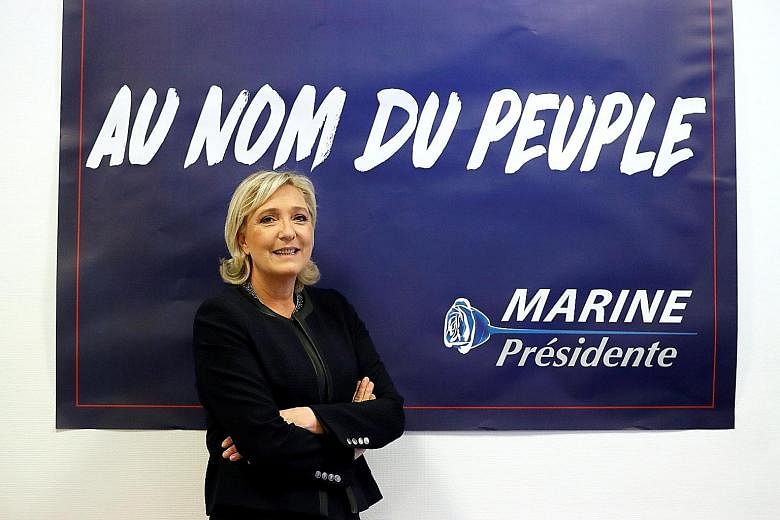The chief political aide of Ms Marine Le Pen, the leader of the far right National Front (NF) party in France and candidate for the presidential election, has just been put under investigation by the country's magistrates. If the charges are correct, the NF leader has been cheating on European Parliament expenses to pay her bodyguard and her chief political aide for jobs that they didn't do.
This may sound strange. The NF, like other European far right parties, is virulently hostile to the European Union - so why is it able to use EU resources to build itself up? Yet as we discuss in a new research article for the Review Of International Political Economy, the NF is far from unique.
Far right parties hate the EU - yet without it, many of them would have died: Right-wing populists like the NF typically hate the EU. They advocate radical changes to the EU - or outright withdrawal from it. Yet without the EU's support, they almost certainly would have a far weaker voice in national politics. Many far-right parties rely on Europe both for elected positions and for money.
The first key resource that Europe offers to far-right parties is the chance to get elected. Far-right parties often have a tough time getting launched into politics. They are not part of the political mainstream, so they may face a self-fulfilling prophecy of failure. People are unlikely to vote for these parties, even if they agree with some of their positions, because they don't know much about them, and likely think they don't have any real chance of success.
European Parliament elections have boosted far-right parties such as the NF and the UK Independence Party or Ukip. European voters don't take European Parliament elections very seriously, treating them as what political scientists call "second-order elections". This means voters are more willing to use their European Parliament votes to protest against the government and the political mainstream, making it more likely they will vote for fringe parties, giving these parties greater credibility. When the NF won a third of the seats in the European Parliament elections in 2014, it sent shock waves through France and Europe.
The second key resource that Europe offers to fringe parties is money. Parties elected to the European Parliament or categorised as "Europarties" can receive European funding. This again can be very valuable - especially to parties which do not have parliamentary funds or wealthy backers in their home countries. In theory, this money is supposed to go to Europe-level activities - such as hiring assistants who help members of the European Parliament research legislation and do their jobs. In practice, there is not as much supervision over spending as there ought to be.

This is what has got the NF into trouble. Ms Le Pen is accused of having paid her chief political counsellor and her bodyguard on the pretence that they were parliamentary assistants, when they were nothing of the sort. Other members of the NF are accused of similar abuses.
Brexit would never have happened without European Parliament resources: The most notorious example of the EU helping a virulently anti-Europe party is Ukip, which was the key mover behind Britain's vote to exit the EU. It's safe to say that Ukip would have died long before Brexit became a possibility if it hadn't been for the European Parliament.
European Parliament elections were crucial to Ukip's success. British national elections are held under a "first past the post" rule, which gives electoral seats to the party with the most votes in a given constituency. These rules make people much more likely to vote for big parties, and much less likely to waste their votes on small ones. In the description of Ukip's former leader Nigel Farage, "the first-past-the-post system is brutal to a party like us". Britain's elections to the European Parliament, in contrast, are conducted under a proportional representation system that is much more forgiving to fringe parties. This combined with the protest vote to give the Ukip 24 seats after the 2014 European Parliament elections, as opposed to 20 for the Labour Party and 19 for the Conservative Party.
Ukip was poorly funded in Britain, and hence had strong reasons to suck up as much money as it could from the European Parliament. Academic Nathalie Brack describes how eurosceptic parties like Ukip practised "strategic absenteeism", in which their members turned up at Parliament solely to collect the money that they received for attendance. Professor Brack quotes one Ukip member of the European Parliament as saying: "If I don't come and put my card in the slot to vote, I don't get my money to give to the party." Without this funding source, Ukip would have been far more poorly resourced.
As both Ukip and the NF stories demonstrate, there are two things that far-right parties like about the EU - its election resources and its money. It seems paradoxical that the bloc is paying the parties that want to dig its grave. Indeed, the trouble that NF is in may reflect the fact that some European authorities are unwilling to continue this arrangement. NF is certainly not the only party guilty of sketchy behaviour with European Parliament money - the fact that the Parliament has gone after it, triggering the French investigation, may have as much to do with politics as the desire to uproot corrupt practices.
WASHINGTON POST
•Henry Farrell is an associate professor of political science and international affairs at George Washington University. Abraham Newman is an associate professor at the Edmund A. Walsh School of Foreign Service at Georgetown University.

